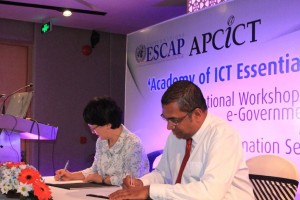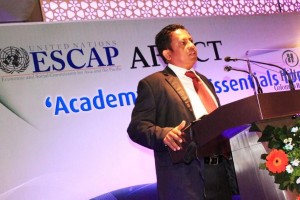Every public servant should do his best to serve the people: Dep. Speaker
View(s):Every government servant is called upon to do his best to serve the public. This is one of the core messages of the ‘Mahinda chinthana Vision for the future’. It is the duty of every Government employee to make people’s life comfortable by carrying out his duties conscientiously making smart and morally sound best use of available tools. As ICT is recognized as the best and smart tool for development, a conscientious Government employee should do his best to learn and apply its benefits to serve the people.
However one must not forget that along with the benefits of ICT there are also its ill effects . ICT without guidance and regulation could bring disaster to society, though through a small percentage of the population. To combat this it is necessary that ICT is coupled with appropriate human skills and moral values”.

UNESCAP / APCICT Director Dr. Hyeum-Suk Rhee and ICTA CEO Reshan Dewapura sign documents pertaining to the launch of UN ESCAP / APCICT’s 27th “Academy of ICT Essentials for Government Leaders” in Sri Lanka .
So said Deputy Speaker Chandima Weerakkody when he, as Chief Guest, participated in the launch of the “Academy of ICT Essentials for Government Leaders” held in Colombo recently (Sep. 03). “The launch of the academy followed by a four-day workshop (3-6 Sep) on two modules of the academy constituted a great step forward”, the Deputy Speaker asserted. Forty Government officers actively engaged in e-Governance and members of the academia selected for participation in the workshop will be trainers of colleagues in their respective offices/ areas of work.
Continuing his address , the Deputy Speaker said that this initiative was a great step forward. This launch enables Sri Lanka to receive the benefits of the academy of the Asia Pacific Training Centre for Communication and Technology for Development (APCICT) . The APCICT, a regional institute of the United Nations Economic and Social Commission for Asia and the Pacific (UNESCAP), set up the academy in 2006. True to its name, the “Academy of ICT Essentials for Government Leaders” has facilitated and promoted ICT among UN ESCAP economies which now totals 62. Sri Lanka is the 27th country to set up the academy. The APCICT academy has developed 11 training modules for Government leaders which have been translated into 12 languages. Two of these modules, namely, Module 3 e-Government Applications and module 6 Network Information Security

Deputy Speaker Chandima Weerakkody delivering his address as Chief Guest on the occasion of the launch of the 27th “Academy of ICT Essentials for Government Leaders” in Sri Lanka and the opening session of the four-day workshop based on two modules of the Academy held in Colombo .
and Privacy were selected as the themes for the four-day workshop.
Stressing that Initiatives like this could create great benefits , the Deputy Speaker pointed out how a far sighted vision of President Mahinda Rajapaksa had brought about great positive changes. Such an epoch-making change for the better came about as the fruition of the initiative the President took in 2004 to use ICT for Development. As part of this initiative it was the President’s concept to take the dividends of ICT to the village. At the beginning of the said far-sighted initiative the benefits of ICT were the prerogative of a small urbane elite population. Thanks to the foresight of the President nearly a decade ago, today ICT literacy has reached 40 per cent from the 4 per cent mark of 2004. Similarly Sri Lanka’s Networked Readiness Index which was 83 out of 115 countries in 2006 reached the 71st mark in 2012 out of 142 countries and improved to the 69th position in 2013 out of 144 countries.
The launch and workshop are the results of the collaborative effort s of ICTA and the Asia Pacific Training Centre for Information and Communication Technology for Development (APCICT). From ICTA, Chairman, Senior Presidential Advisor and Peradeniya University Chancellor Prof. P. W. Epasinghe, Board member Earle Fernando CEO Reshan Dewapura, Programme Director and Legal Advisor Jayantha Fernando and Re-engineering Government Programme Director Wasantha Deshapriya also participated in the event. From UNESCAP / APCICT, Director Dr. Hyeun-Suk Rhee and Programme Manager Robert de Jesus and resource persons including Philippines Idea Corp CEO Dr. Emmanuel Lallana also took part.
| So said Deputy Speaker Chandima Weerakkody when he, as Chief Guest, participated in the launch of the “Academy of ICT Essentials for Government Leaders” held in Colombo recently (Sep. 03). “The launch of the academy followed by a four-day workshop (3-6 Sep) on two modules of the academy constituted a great step forward”, the Deputy Speaker asserted |


